Classic Udon Noodle Soup (Kake Udon or Su Udon) is all about simplicity: thick, chewy noodles and a delicate homemade broth deliver a hot bowl of comfort. Enjoy this vegan-adaptable soup as is, or add tempura, fish cake, and vegetables for a more substantial meal.
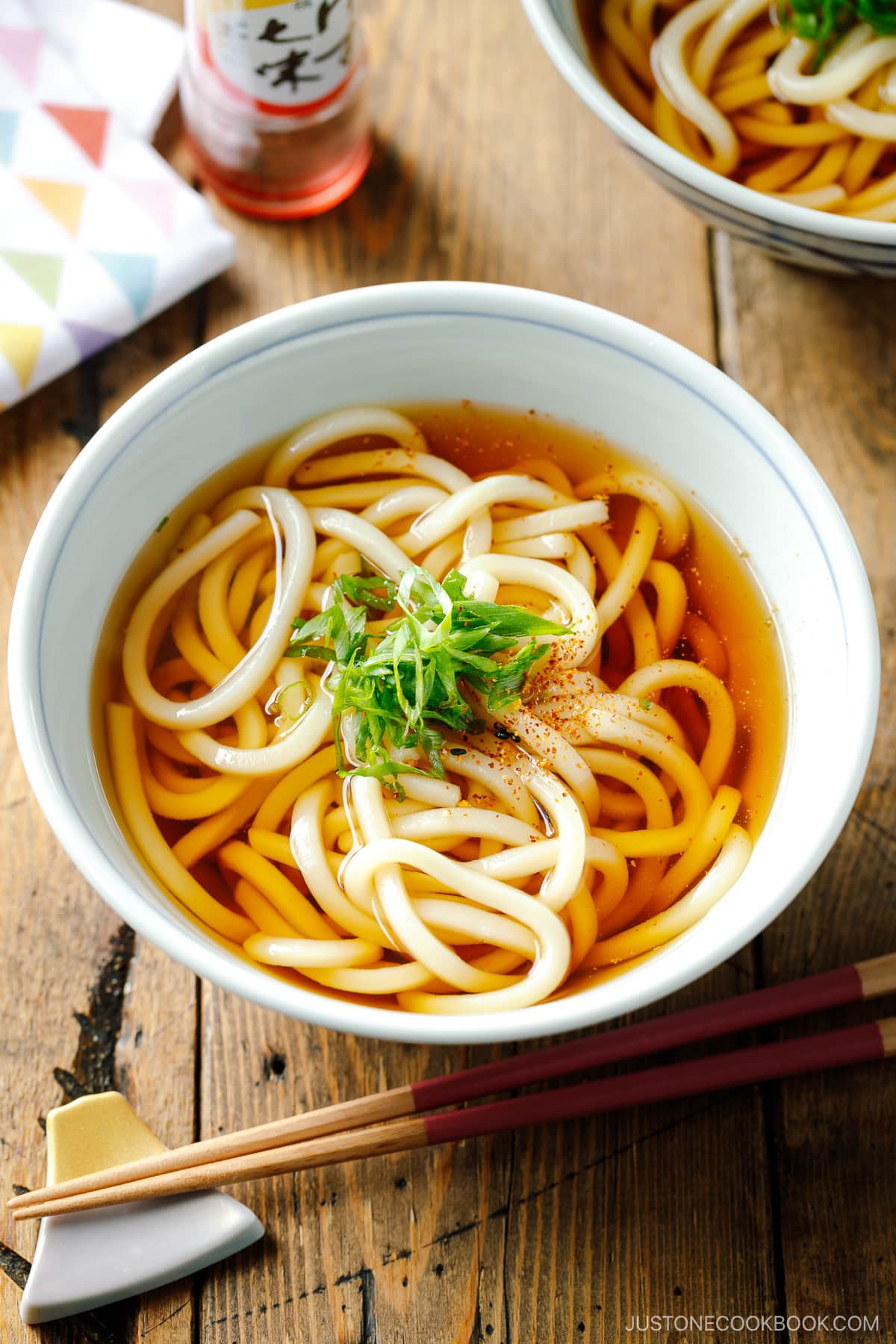

Of all the Japanese noodles, I often turn to udon when I need comfort. To me, these chewy, slippery noodles seem to have a special power to soothe any troubles and satisfy one’s hunger. We eat them anytime, for a quick lunch or a fulfilling dinner. And they are perfect whether hot, cold, or anywhere in between.
I love all kinds of udon dishes, but nothing beats the classic, simple hot udon noodle called Kake Udon (かけうどん). Today, let’s learn more about it and how to make an authentic bowl at home.
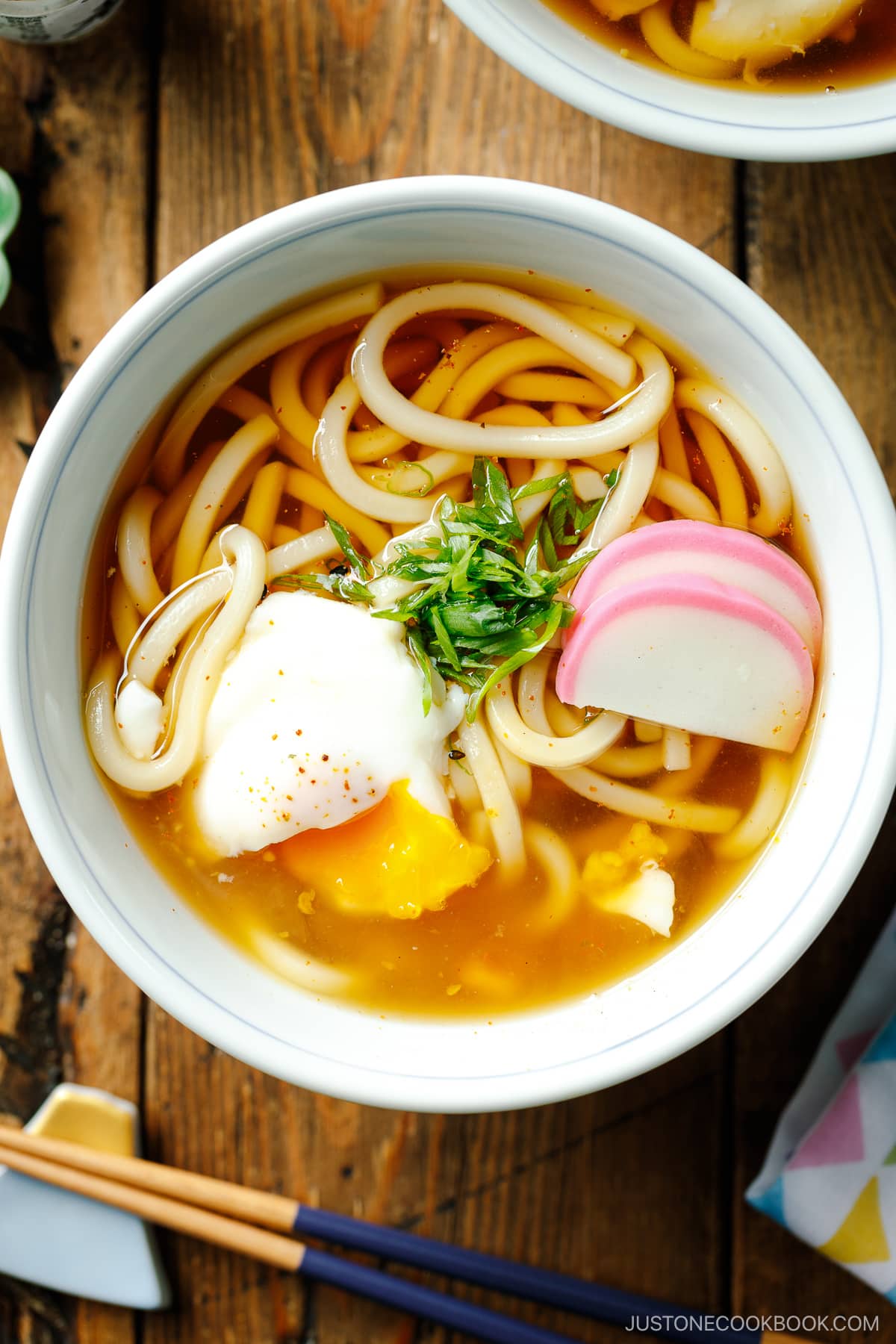

What is Kake Udon?
Kake Udon (かけうどん) is the most basic form of hot udon noodle soup, consisting of udon noodles in a flavorful dashi-based broth. It is inspiring because it celebrates simplicity.
In the Kansai region (Osaka, Kobe, and Kyoto area), this udon noodle soup is called Su Udon (素うどん). The major difference between the Kansai and Kanto (Tokyo) regions lies in the color of the soup broth.
Su Udon’s broth is much lighter in color compared to Kake Udon’s. People in the Kansai region use a light-colored soy sauce called Usukuchi Shoyu (薄口醤油) instead of regular soy sauce.
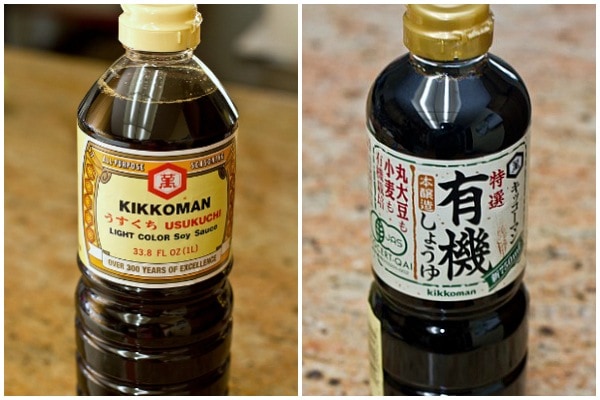

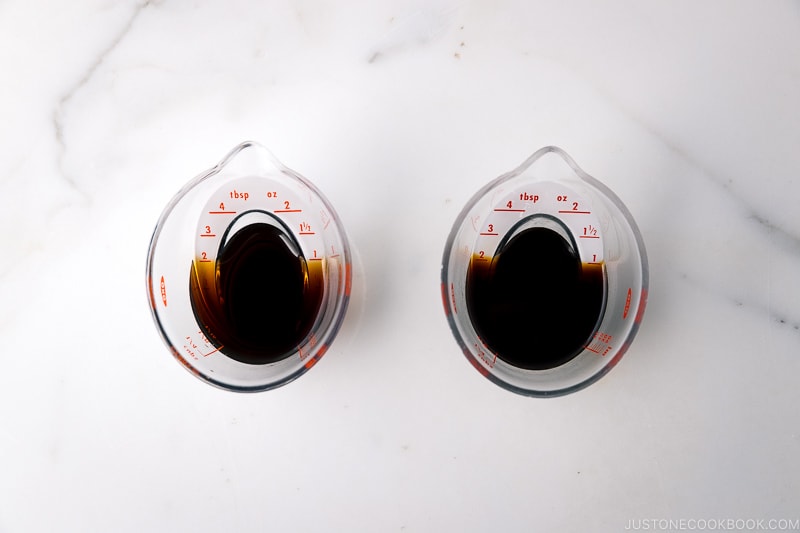

This simple udon noodle soup can be transformed into something more by changing the seasonings or toppings. For example, you can make Kitsune Udon with inari age (seasoned fried tofu), Nabeyaki Udon with shrimp tempura and various toppings, and Chikara Udon with toated rice cake.
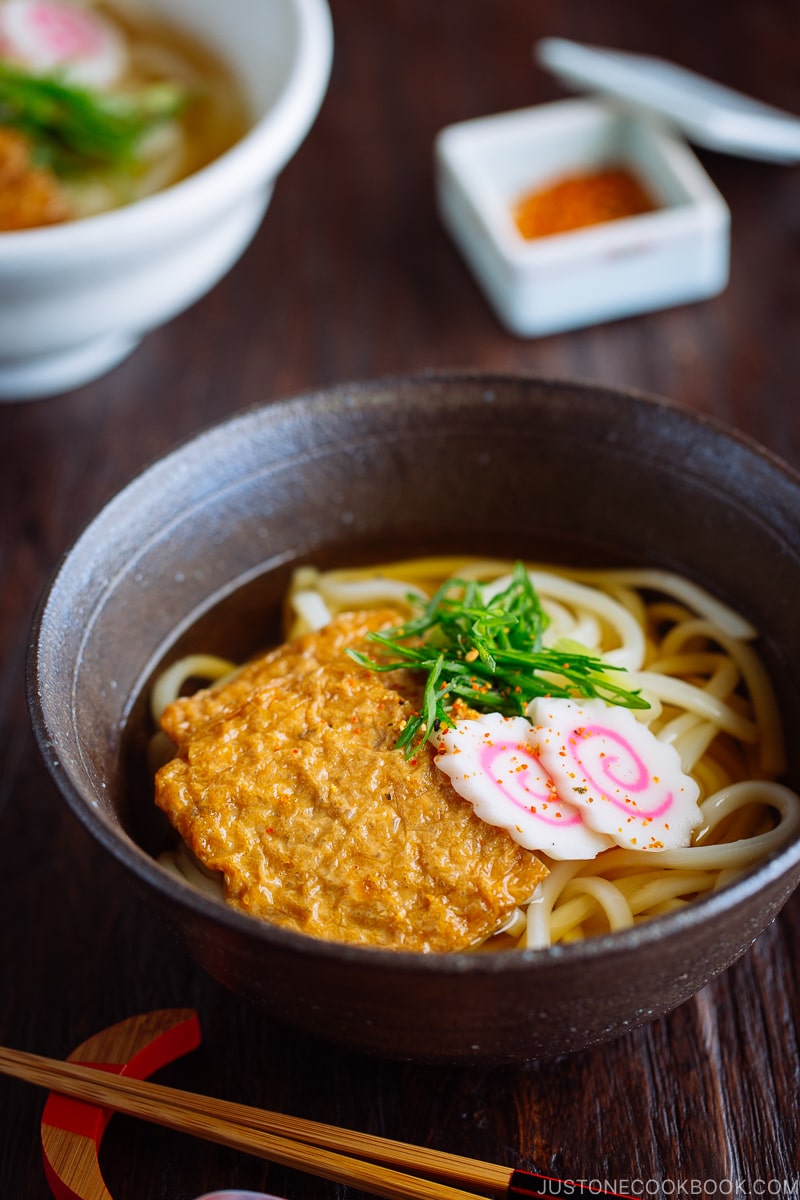

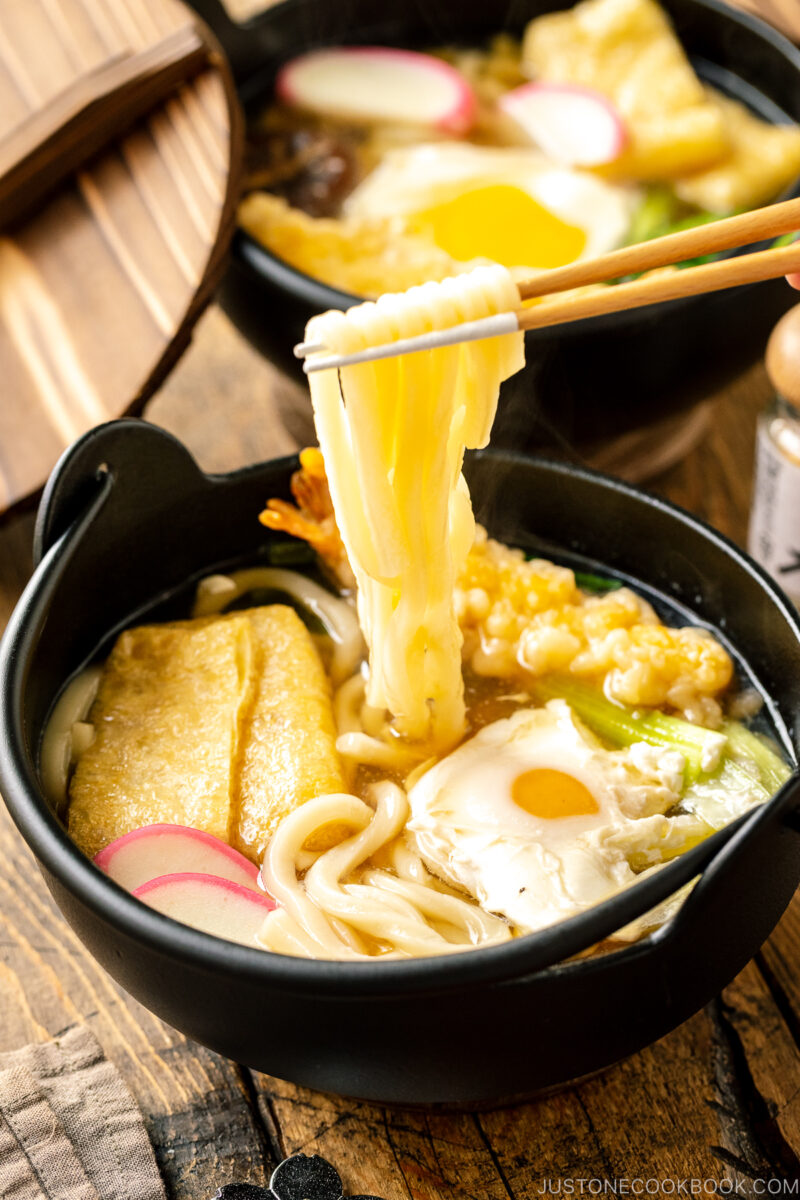

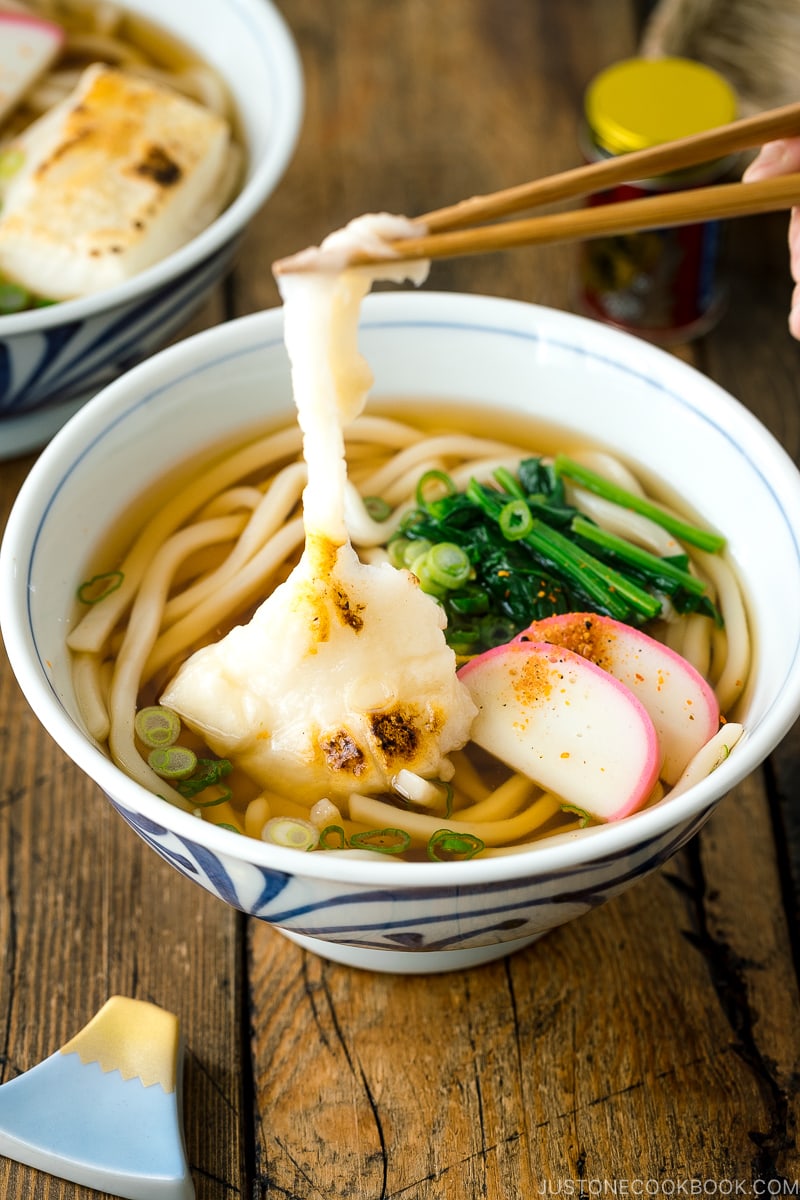

🗾 Did you know? Several regions in Japan are known for udon noodles. The most well-known prefecture is Kagawa in the Shikoku region, followed by Fukuoka in the Kyushu region and Saitama in the Kanto region. Kagawa is known for Sanuki Udon (讃岐うどん), which is characterized by its chewy and elastic noodles and sardine soup stock.
Ingredients for Basic Udon Noodle Soup
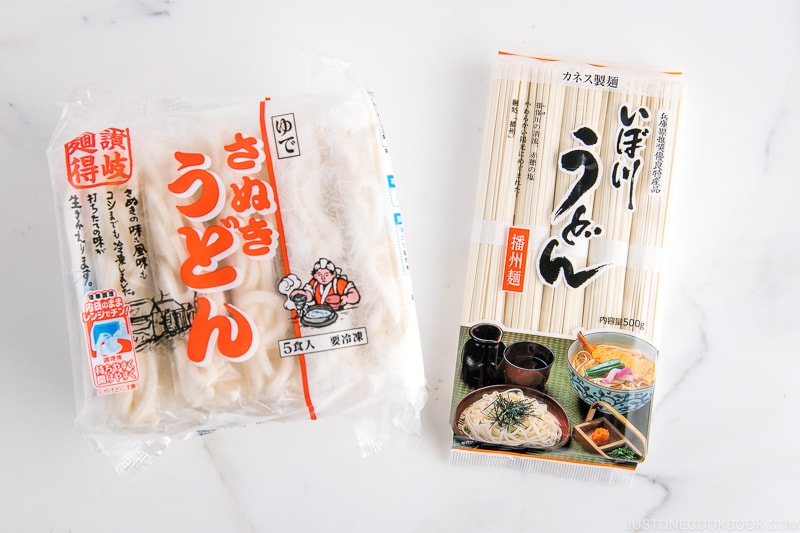

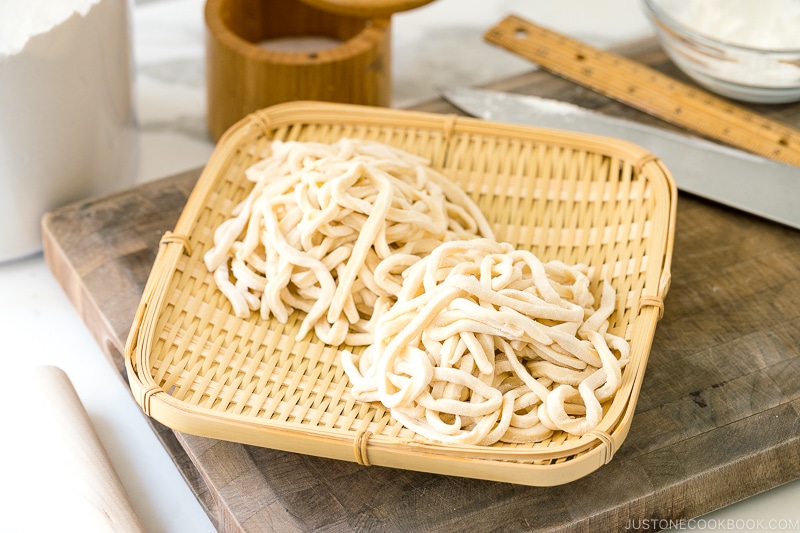

- Udon noodles – Frozen and dried udon noodles are easily accessible outside Japan. You can also make homemade udon noodles from scratch with three ingredients—flour, salt, and water!
- Noodle soup base (mentsuyu or tsuyu) – I will discuss this in detail in the following section.
- Toppings of your choice – You can keep it simple with sliced green onions and shichimi togarashi (Japanese seven spice). See more choices below.
How to Make Udon Soup Broth
I’ll share two methods so you have the options depending on the ingredients that are accessible to you.
📝 It’s good to remember each udon bowl requires roughly 300 ml (1¼ cup) of soup broth.
Method 1: Make it from scratch
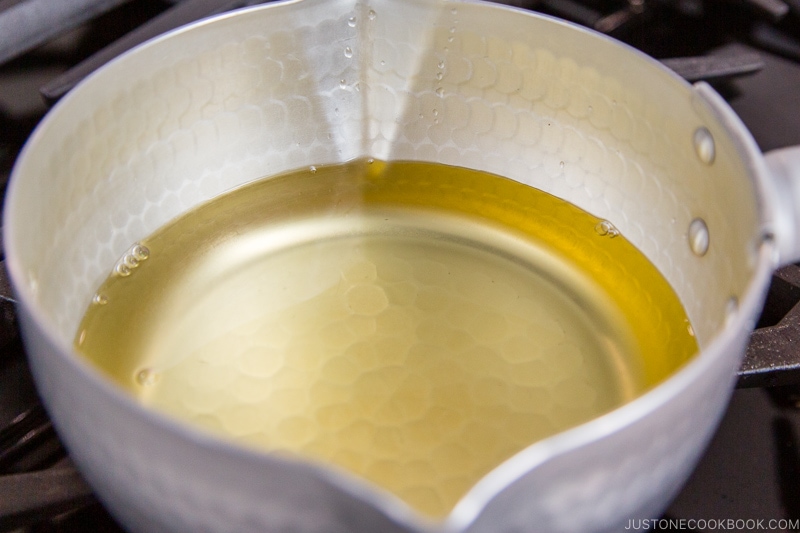

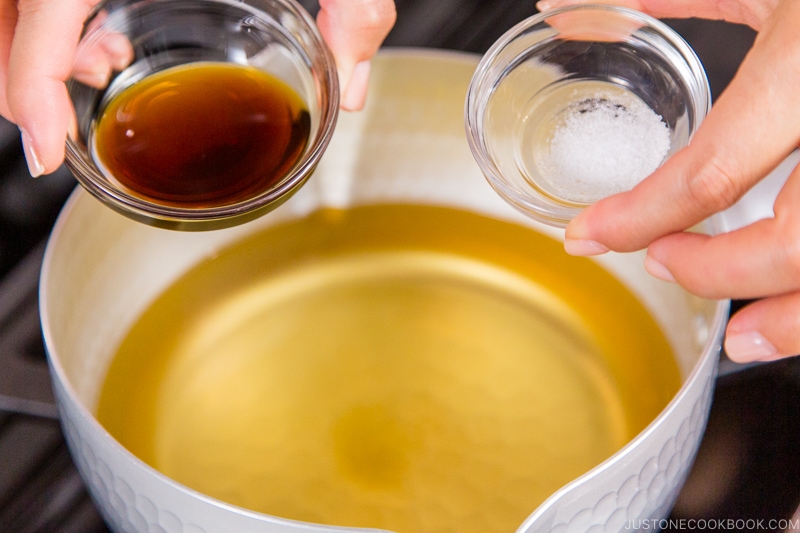

To make udon soup broth, make dashi (Japanese soup stock) and season it with soy sauce, mirin, (sometimes sake), sugar, and salt. It’s very simple and easy!
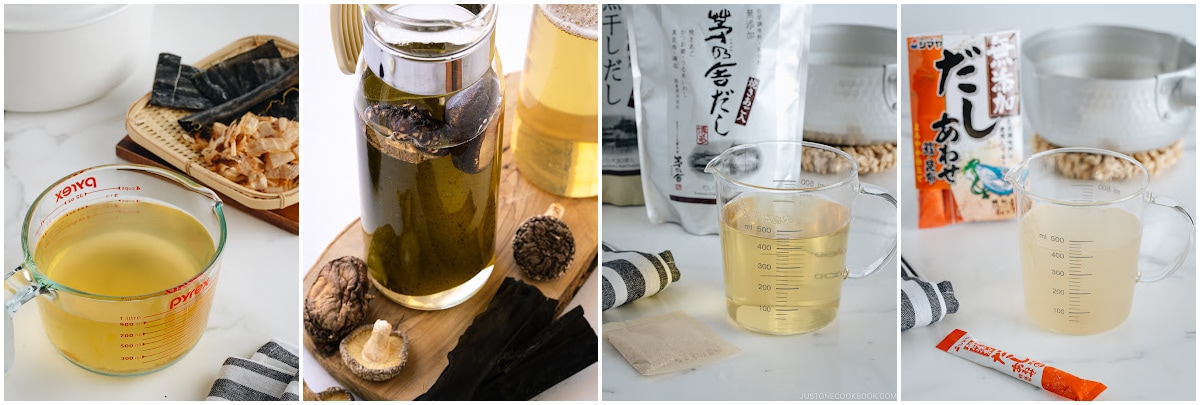

You can make dashi from scratch with kombu and katsuobushi, which takes about 30 minutes or less. If you want to speed things up, use a dashi packet or dashi powder. For vegetarians/vegans, you can make Vegan Dashi.
Method 2: Make it with noodle soup base (mentsuyu)
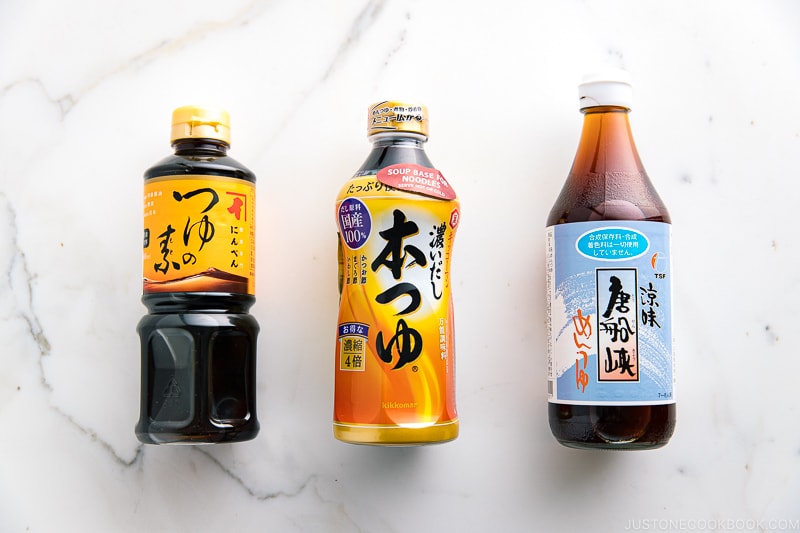

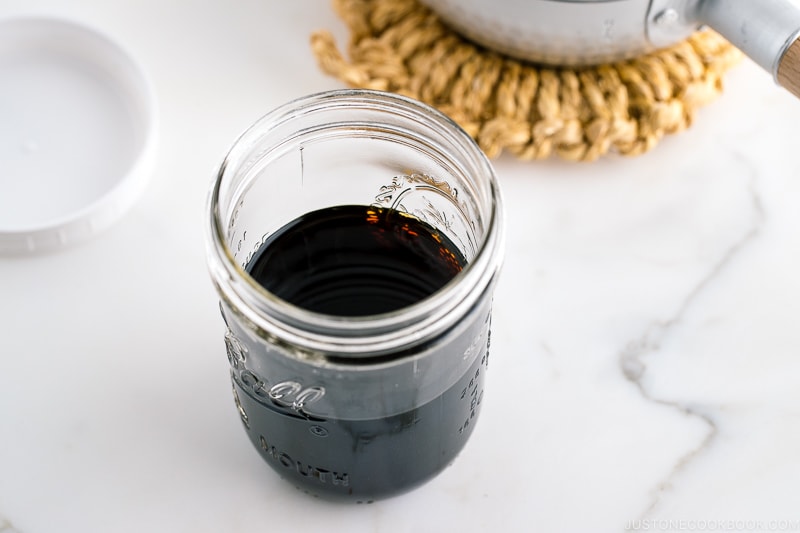

If you can buy a bottle of noodle soup base (mentsuyu or tsuyu) at a Japanese or Asian grocery store or from Amazon, you can instantly make udon soup broth by mixing it with hot water. Read the bottle’s instructions carefully, as each brand has a different mentsuyu-to-water ratio.
For those who enjoy soba and udon noodles, I recommend keeping a bottle of mentsuyu in the fridge. You can make noodle soup instantly! You can also make Homemade Mentsuyu.
How to Cook Udon Noodles
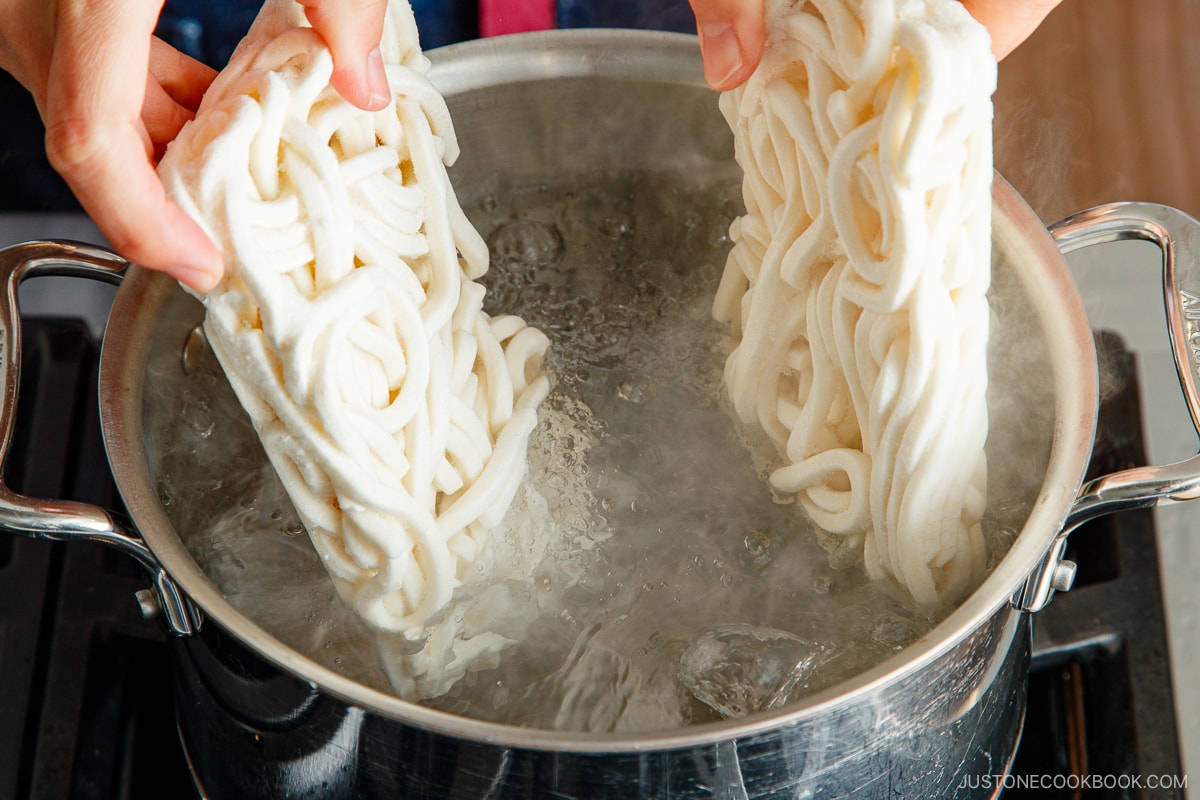

To cook udon noodles, prepare a large pot of water. They already contain salt, so we do not need to salt the water (the same goes for soba noodles). Cook the noodles according to the package instructions. For fresh noodles, see the cooking instructions in my Homemade Udon Noodles recipe.
Why don’t we put the udon noodles directly into the soup broth? Udon noodles release starch and we want to make sure the soup broth is clear and not cloudy due to starch.
Topping Choices
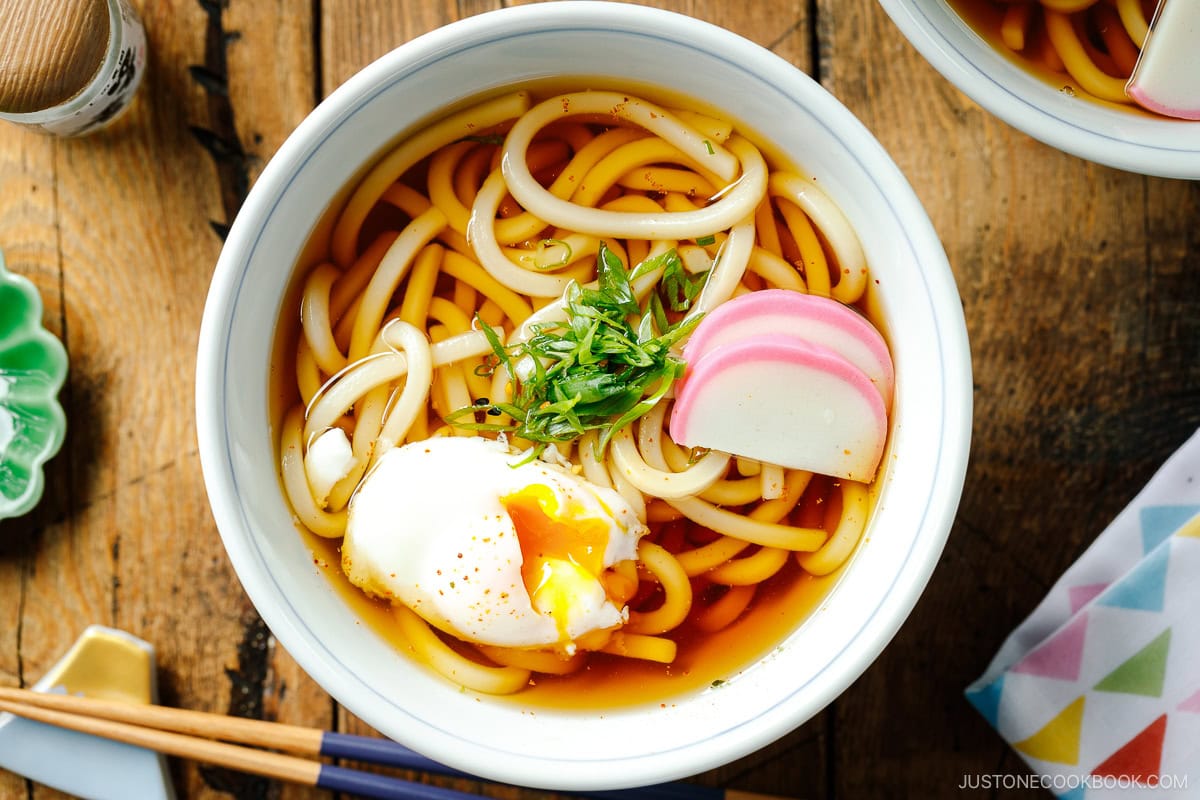

Kake Udon is all about simplicity, so we usually garnish the noodle soup with thinly sliced green onion and Shichimi Togarashi (Japanese seven spice). For variety, you can experiment with different toppings, and these ingredients are readily available at Japanese markets.
As you can see, the possibilities are endless. No matter how you prepare it, udon is bound to satisfy.
Toppings that do not require any prep:


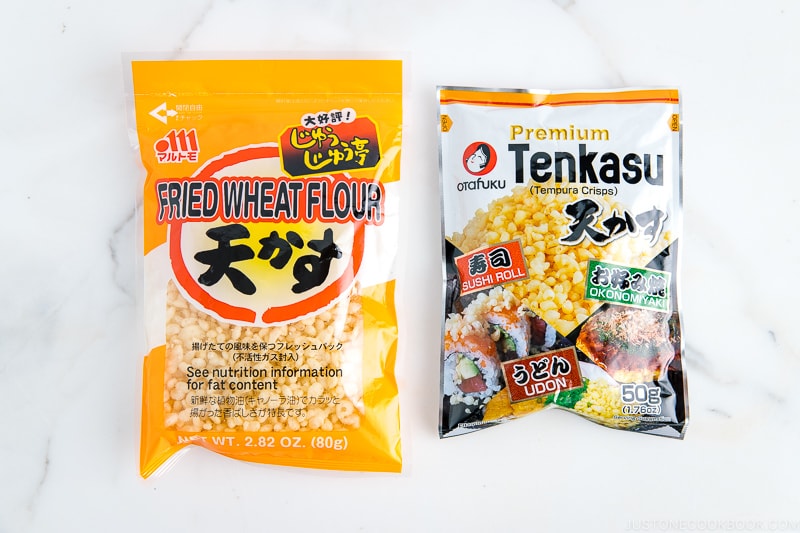

Toppings that require additional prep:
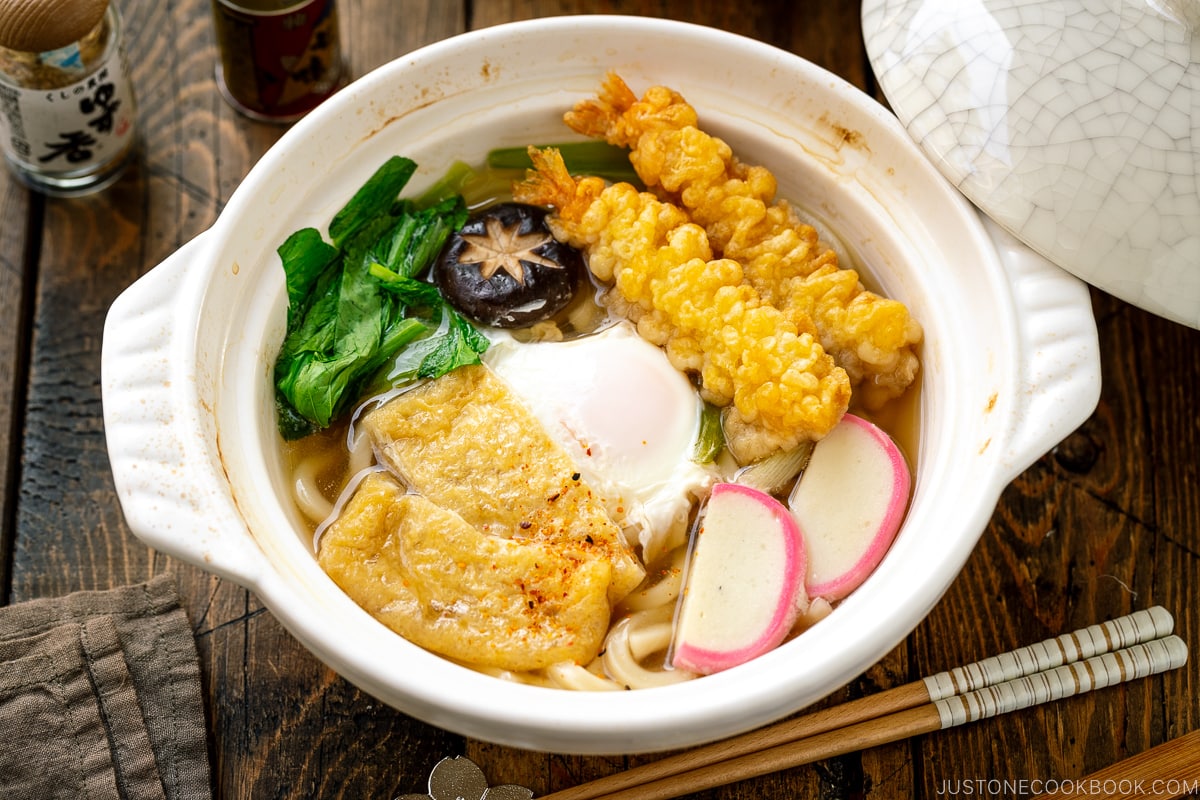

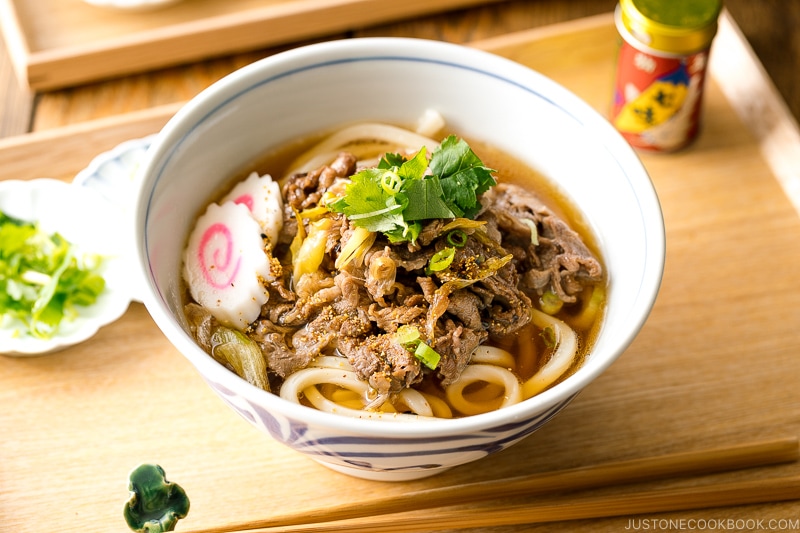

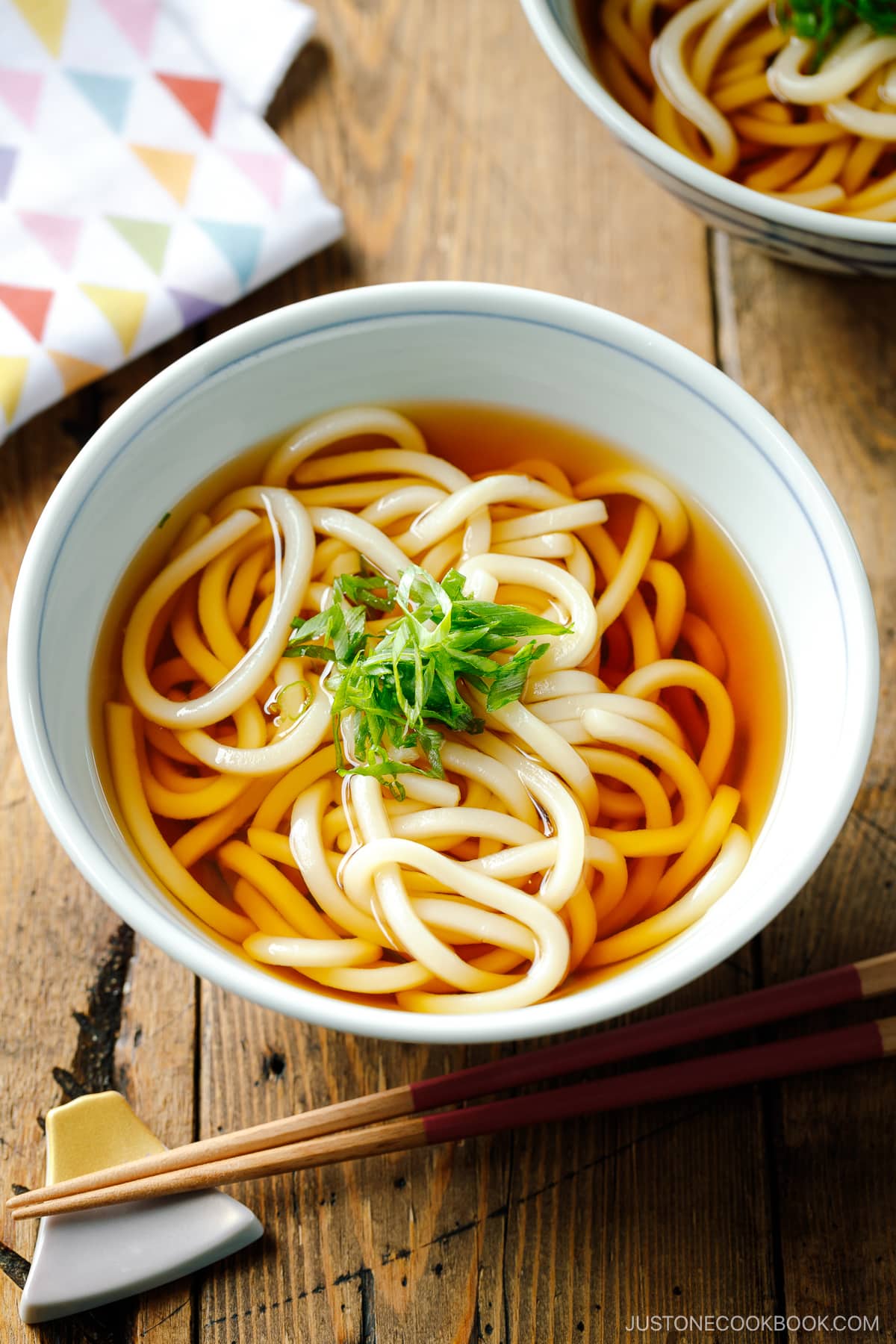

Kake Udon vs. Kamaage Udon
Lastly, I want to briefly discuss Kamaage Udon (釜揚げうどん), another type of udon noodle dish that resembles Kake Udon.
Many people get confused with both types of udon as they are served with minimal garnishes, despite being prepared differently.
Kamaage literally translates to “pull out of the pot,” and it has a unique serving style. Unlike most udon noodles, which are quickly rinsed under cold running water after cooking, Kamaage Udon is served directly from the pot into a bowl, often with the hot cooking liquid. Because the cooked noodles are never rinsed with cold water, Kamaage Udon has a distinct softer, velvety texture and starchy flavor. You would then dip the noodles into a dipping broth called ‘tsuyu (つゆ)’ served alongside.
So it is rather different from Kake Udon, where the noodles are chewy with a supple bite, and a dashi broth is poured into the bowl of noodles.
More Delicious Udon Recipes
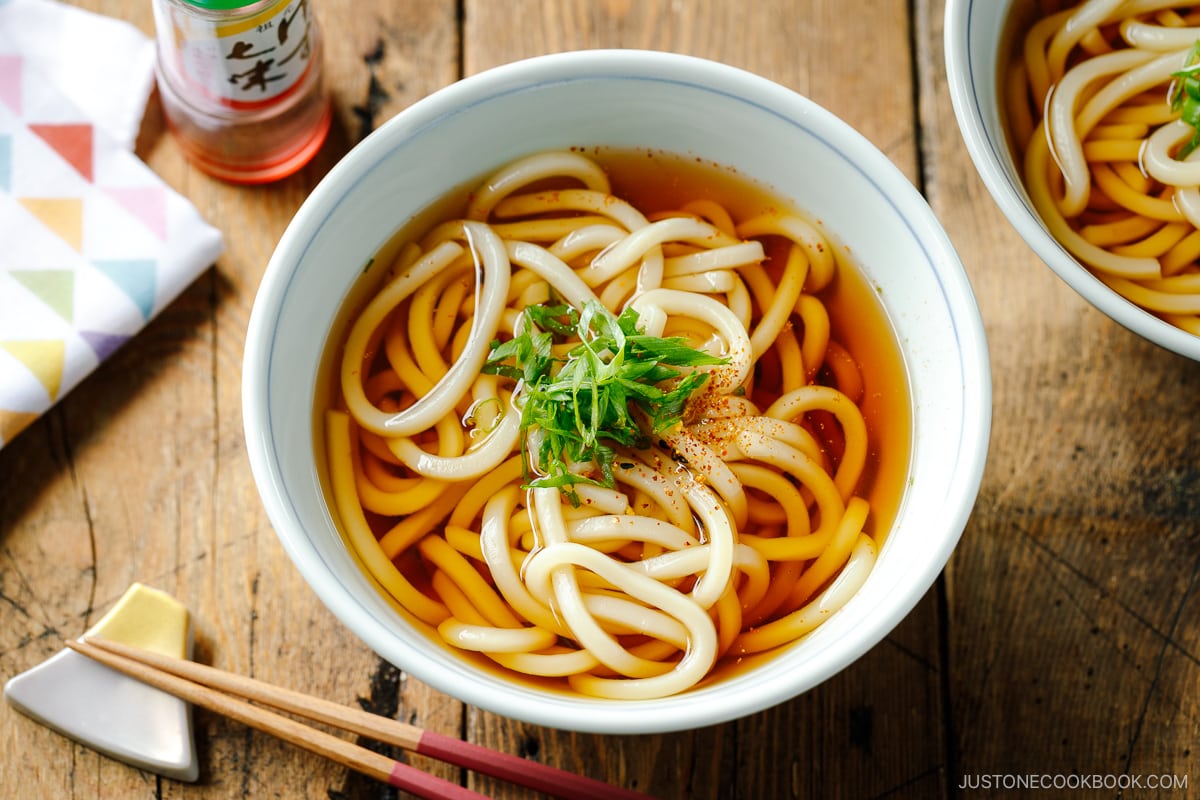

Wish to learn more about Japanese cooking? Sign up for our free newsletter to receive cooking tips & recipe updates! And stay in touch with me on Facebook, Pinterest, YouTube, and Instagram.
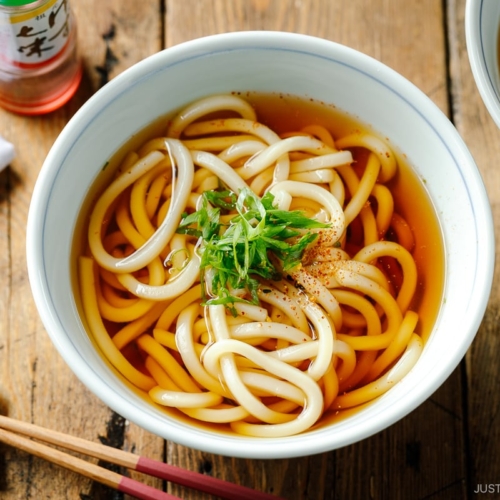

Udon Noodle Soup (Kake Udon)
Classic Udon Noodle Soup (Kake Udon or Su Udon) is all about simplicity. Thick, chewy noodles and a delicate homemade broth deliver a hot bowl of comfort. Enjoy this vegan-adaptable soup as is or add tempura, fish cake, and vegetables for a more substantial meal.
Ingredients
For the Quick Broth (optional)
Prevent your screen from going dark
Instructions
To Prepare the Homemade Broth
-
In a medium saucepan, add 2⅓ cups dashi (Japanese soup stock), 1 Tbsp mirin, 1 tsp sugar, 1½ Tbsp soy sauce, and ⅛–¼ tsp Diamond Crystal kosher salt.
-
Bring the broth to a gentle simmer. Once the broth is simmering, remove it from the heat. Cover with a lid and set aside.
To Prepare the Quick Broth (with mentsuyu; optional)
-
Follow the instructions on your concentrated mentsuyu bottle for the correct mentsuyu-to-water dilution ratio for noodle soup broth (shown here as めんのかけつゆ).
-
In a medium saucepan, combine the water, mentsuyu and mirin. For the brand of mentsuyu that I use, I add 2⅓ cups water, ⅓ cup mentsuyu (concentrated noodle soup base), and 1 Tbsp mirin. Bring it to a simmer over medium heat. Once simmering, remove the pot from the heat. Cover with a lid and set aside.
To Cook the Udon Noodles
-
Bring a large pot of water to a boil. When the water comes to a full rolling boil, add 2 servings udon noodles and cook according to the package instructions. This brand of frozen udon noodles requires reheating them for 1 minute. Using chopsticks, stir the noodles to loosen them up. For fresh noodles, see the cooking instructions in my Homemade Udon Noodles recipe.
-
When the noodles are done cooking, drain them in a colander or pick them up with a fine-mesh strainer. Serve the hot udon noodles in individual bowls.
Nutrition
Nutrition Facts
Udon Noodle Soup (Kake Udon)
Amount per Serving
% Daily Value*
* Percent Daily Values are based on a 2000 calorie diet.
Editor’s Note: This post was originally published on October 8, 2021. It was republished on May 3, 2024, with more helpful content, new images, and a new video.

